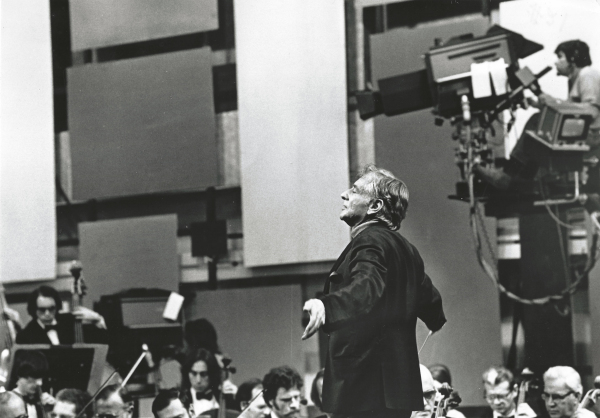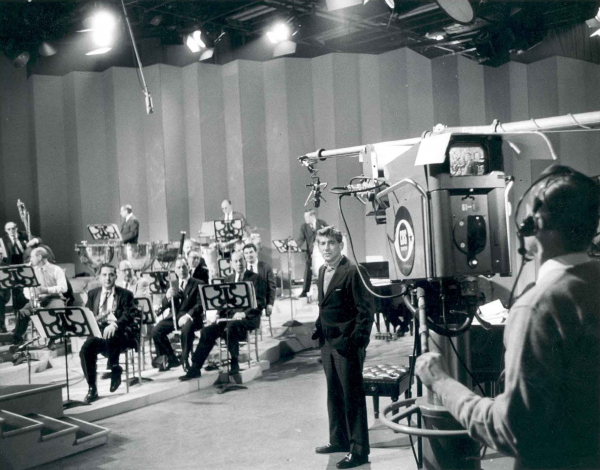Latest News
Preserving Bernstein’s Legacy Through Film
Posted October 14, 2025
Preserving Bernstein’s Legacy Through Film
by Hannah Webster

Photo by Milton Feinberg
This past July, The Leonard Bernstein Office donated 1,931 video and audio tapes to the Library of Congress. We are thrilled that, after many years of thought and preparation, these tapes have been moved to their forever home.
This large donation boasts some of the best of Leonard Bernstein’s career-defining moments on screen. It features a complete set of the eleven Omnibus programs, including the famous Beethoven’s Fifth episode where a life-sized musical score was displayed on the floor for the first (and only) time. It also contains original broadcast copies of the Ford and Lincoln series that showcase Bernstein’s historically significant tours with the New York Philharmonic to Moscow, Venice, Japan, and Berlin in the 1950s and ‘60s. Also included are many selections from his celebrated Young People’s Concerts, the touchstone educational programs for which he is still known today.

Leonard Bernstein with members of the Philharmonic rehearsing for a television broadcast, ca. 1958. Photo by Bert Bial, courtesy of the New York Philharmonic Shelby White & Leon Levy Digital Archives.
Likewise, the collection consists of many of Bernstein’s worldwide conducting engagements, numerous interviews, news appearances, and special isolated camera footage of him conducting some of his own compositions. Many of the tapes include footage that has never been commercially released, such as outtakes from Peter Rosen’s biographical documentary Reflections. This donation also features rare footage of Bernstein teaching conducting to up-and-coming conductors at the LA Philharmonic Conducting Institute and the Pacific Music Festival. If all of that was not exciting enough, many full-length interviews with Bernstein’s friends and family from the 1998 American Masters documentary Leonard Bernstein: Reaching for the Note are included as well.
According to Mark Horowitz, Senior Music Specialist at the Library of Congress, the Leonard Bernstein collection has been “the most heavily used collection in the Music Division for at least the last ten years.” The LBO is eager to see how these audiovisual additions to the collection will aid researchers. Through them, one could observe, for example, how Leonard Bernstein’s television mannerisms changed throughout his career, or perhaps study how and why broadcasters prioritized music programming in the early days of American television. From the cultural to the technical, there is something for everyone in this collection. The possibilities are truly endless!
We hope this rich, audiovisual compendium of Bernstein’s television career will take researchers back to the brilliance of analog media and the joy of keeping a legacy alive through film.
N.B.: The Leonard Bernstein Office would like to recognize Marie Carter, Senior Consultant for the LBO and former VP for Licensing and Publishing, who spearheaded the project. Her thirty-five years of experience with the Bernstein video collection was invaluable: she parsed through umpteen spreadsheets, sorted through hundreds of tapes, and organized the collection into easy-to-digest categories. We thank her profusely for her work and her wisdom. We also deeply thank Ezra Gans, our Licensing and Digital Media Assistant, for concatenating an incredible amount of detail as the nuts and bolts of the project came together.
----
Hannah Webster is Head of Licensing for The Leonard Bernstein Office.